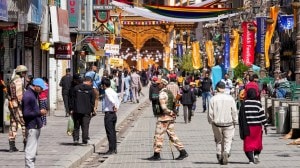Through the Looking Glass
‘‘Did you see that wife who has packed lunch for her husband?’’ he questions, unmindful of the pain from a recent leg fr...

|
Tamil litterateur Ashokamitran
at T-Nagar, Chennai |
SAHITYA Akademi award winner Ashokamitran is curiously detached about the one place he acknowledges is close to his heart: a park at T-Nagar in Chennai, where real-life people walked into his loose sheaves of paper before making their way as quintessentially human characters in his numerous Tamil short stories, novels and novellas. But one soon learns that it is a detachment born out of familiarity. Memories of hours spent writing on a solitary cement bench, wedged onto a then muddy, pot-holed surface, run too deep to be trivialised for strangers.
Walking on the quaint pavement on the recently levelled ground to the metal bench that has long replaced the cemented one at Dr Natesan Park, Ashokamitran, true to character, shrugs off the transformation as a ‘‘different method of living of a different generation’’. But people, even of a different generation, never fail to win his attention and those here today — late-morning walkers, solitary souls, the unemployed — trigger memories of similar images captured way back in 1967, when he ‘‘discovered’’ the park.
It does so on this day as well, more so because Ashokamitran is here after 16 years. Starting with his critically acclaimed debut novel, Karaindha Nizhalgal (Dissolved Shadows), published in 1967, he says, he wrote most of his 220 short stories, seven novels and 10 novellas in the park. Characters merged into storylines for an hour after 6.30 am whenever he came here; he would leave before the sun got even mildly harsh and the movement of traffic and people, too loud. If inspiration struck him during the day, he would lock it away, only to release it the next morning, as it was in ‘‘natural light’’ that he could write best.
And so it went on till 1985, with the writer’s few absences occasioned only by rains or bouts of asthma. Once, a drizzle caught him unawares and made him abandon his favourite fountain pen for a ballpoint. ‘‘It couldn’t be helped,’’ he shrugs practically.
Similar pragmatism characterises most aspects of his life. He is one of the few writers to translate his own works into English, and he admits he made the effort because it translates well into sales. ‘‘I don’t do it for any particular liking for the job. I am forced to do this,’’ he says cryptically.
Noting the general resistance to English translations of regional writings, Ashokamitran says that he is certain that even his widely acclaimed works — Water, 18th Parallel, Sand, Colours of Evil — will never make it to the bestseller list. ‘‘Regional writers like myself must be content with limited sales,’’ he says before making his way out and boarding a call taxi to his home 15 km away.



- 01
- 02
- 03
- 04
- 05




























